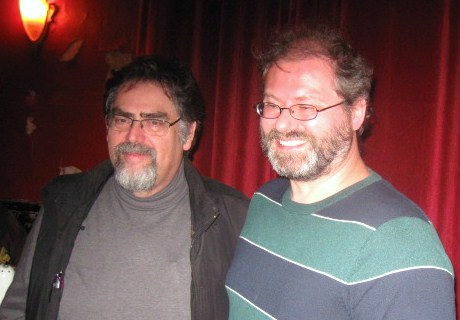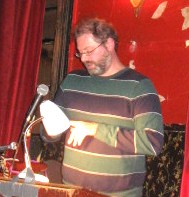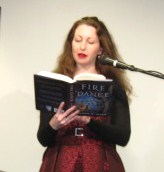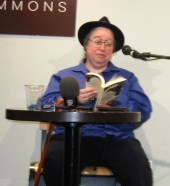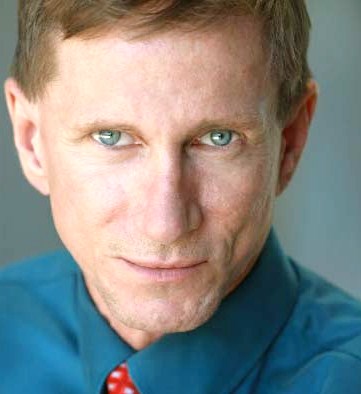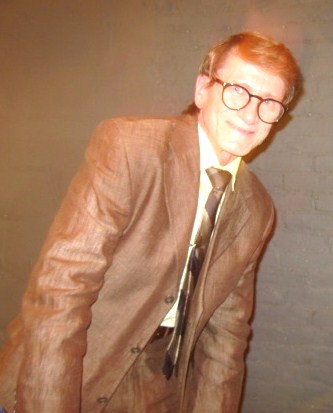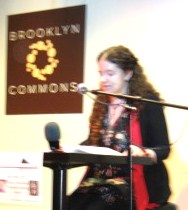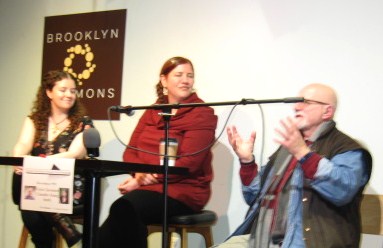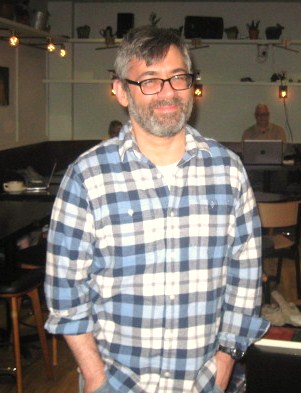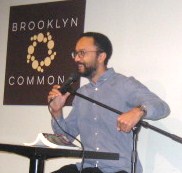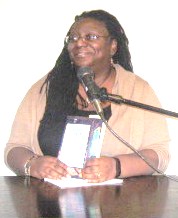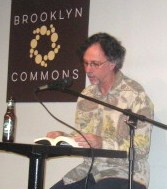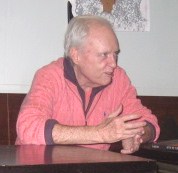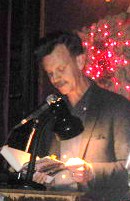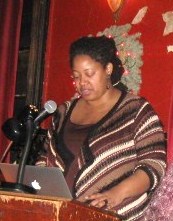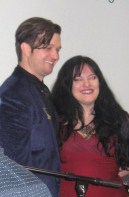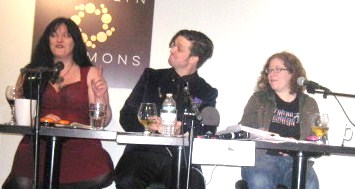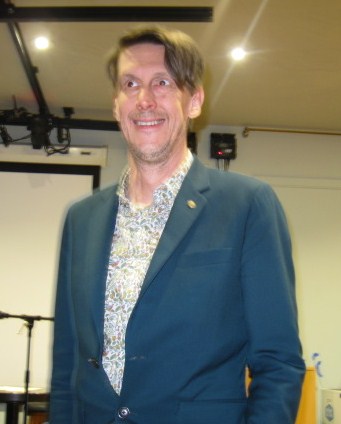
Henry Wessells
By Mark L. Blackman: On the evening of Tuesday, February 6th, at its venue, the Brooklyn Commons Café in Brooklyn (somewhere on the Ruins of Earth), the New York Review of Science Fiction Readings Series presented a tribute to the brilliant author and poet Thomas M. Disch (1940-2008), a celebration of his life and work, guest-hosted by Henry Wessells (a past guest curator) and featuring his peers and friends, including his literary executor, readings from his works and a short film.
The evening began with Series Producer and Executive Curator Jim Freund welcoming the crowd to the final session of the Series’ 27th Season, adding that there would be a special Summer Series: .
- July 3rd – David Mack and Seth Dickinson, guest curated by Amy Goldschlager (a former Curator)
- August 7th – A Launch Party/Reading for Sunspot Jungle, with guest curator Bill Campbell
As usual, he cautioned us that the event was being Livestreamed (so watch where you scratch) and asked all who could donate to donate (suggested amount $7, but no one gets turned away).
Freund related that he met Tom Disch during his early days at Hour of the Wolf, and that he was among the first ever to read at the NYRSF Reading Series. Disch’s last public appearance was a reading from his new novel, The Word of God, at a NYRSF event on June 3, 2008, 10 years and two days ago. (It was at the Series’ then-venue, the South Street Seaport, and I was privileged to have attended.) In it, Disch was God (and Philip K. Dick was Satan). Sadly, Disch killed himself by gunshot on July 4, 2008 (he referred to the 4th as “the Holiday”) in his Manhattan apartment. He had been depressed since the 2005 death of his partner, Charles (“Charlie”) Naylor; the two had been together for some three decades.
Shifting tone, Freund announced that the evening had “a sponsor,” and proceeded to read (his delivery bringing to mind Johnny Carson’s pitchman character Art Fern) “Fun With Your New Head.” (“Two heads are better than one. … Only $49.95!”)
(On a personal note, the story collection Fun with Your New Head was the first Disch that I ever read; and, it seems, for Elizabeth Hand as well.)
Then Wessells, a short story writer, poet and antiquarian bookseller, assumed his role of host. As well as a writer of prose – which ranged from wildly satirical stories to dark cautionary tales to works for children – Disch was a poet, and “wanted to be remembered as the Thomas Beddoes of death in America.” (Beddoes was a minor Romantic poet. “Americans,” said Disch once, “don’t read poetry, but they love poets.”) The first part of the evening, he announced, would be a panel on his life, followed by a clip from the film Winter Journey.

Gregory Feeley, Elizabeth Hand, John Clute, Henry Wessells
He was joined on stage by John Clute, Gregory Feeley and Elizabeth Hand. Hand, a multiple-award-winning author of novels and collections of short fiction, and reviewer, read a note from John Crowley, “Remembering Tom,” followed by “Ghost Ship,” a story from Disch’s last blog.
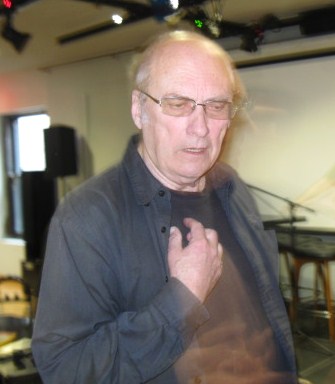
John Clute
Clute is variously an author, reviewer, critic, and encyclopedia writer – he is best known for The Encyclopedia of Science Fiction (the first version of which was published in 1979 and now exists in an online version). He shared that he met Disch in 1961 when they were at NYU, and their friendship continued until Tom’s death. His writing ability was “full-fledged” at 22. He was kind and generous, but he was also quick to end friendships for the littlest reason. He also sent out signals that his death, when it came, would be at his timing and at his own hand.
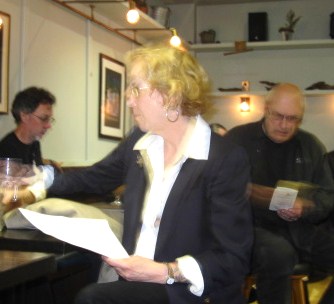
Elizabeth Hand
Gregory Feeley is a writer of and about science fiction. He is Disch’s literary executor (he had two, one for prose, Feeley, and one for poetry; though sometimes overlooked, poetry was half of Disch’s professional life), and is preparing an edition of Disch’s best short fiction. He met Disch in late 1978, when the Magazine of F&SF announced that they were going to publish On Wings of Song, which they described as “his best and longest novel,” in serial form, and he wrote him a letter, which Disch answered. Wings’ protagonist, Daniel Weinreb, was loosely based on Naylor, though the latter was not “a man without talent.” Clute, armed with laptop, read a very brief reminiscence from Pamela Zoline.
Henry Wessells knew him during the last years of his life. (He was with Disch when he spread Naylor’s ashes.) Though regarded as part of the British New Wave, Camp Concentration was “very much an American book.” Disch lived in New York, London, Spain and Turkey, but he remembered his Midwestern roots (he was born in Iowa and grew up in Minnesota). Wessells subsequently cited his “Minnesota Quartet,” The Businessman, The M.D., The Priest, and The Sub. (Disch later said that he thought that The Priest was published 10 years too early.) During his lifetime, he won a Hugo (his only one) for a nonfiction work (Best Related Book), for The Dreams Our Stuff is Made Of: How Science Fiction Conquered the World, and a John Campbell Award, for On Wings of Song (which received nominations for the Hugo and Nebula Awards for Best Novel).
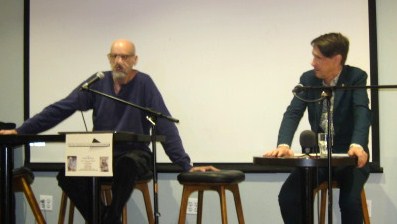
Eric Solstein and Henry Wessells
Filmmaker Eric Solstein, joining Wessells on stage, related that he met Disch at the Sullivan County (aka the Catskills) home that he shared with Naylor, and, after Naylor’s death, Disch asked him to videotape what he called his “suicide note.” The “note,” such as it was, took the form of “a suite of 31 poems,” “a cycle of mourning verse” about Naylor, called Winter Journey, the title of the film as well. Shot with a handheld camera (as was evident), it took, said Solstein, three years to edit it, during which Disch went on with his life. We watched an excerpt, the first three poems. (It may be viewed on Solstein’s YouTube channel.)
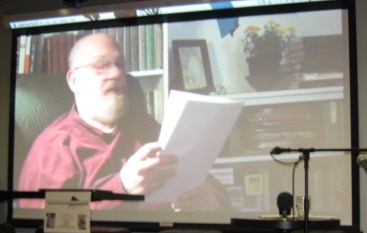
Thomas M. Disch on video
During the intermission, a raffle was held for donors, with the prizes being a copy of Samuel R. Delany’s The American Shore: Meditations on a Tale of Science Fiction by Thomas M. Disch – “Angouleme” (“Angouleme” was a story in 334), and a copy of a video featuring Disch’s NYRSF readings from 1993 and June 3, 2008.
The second half of the evening focused on Disch’s work. Wessells read a note from Delany, an excerpt from The American Shore, praising him as a “raconteur.”
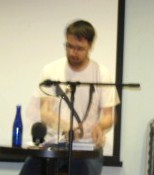
Brendan C. Byrne
Brendan C. Byrne (neither the late Governor of New Jersey nor the since-renamed arena) has written criticism and short fiction. He never knew Disch, except as a reader. He offered an essay on 334. Written in and reflecting 1972 New York, his future Manhattan is a city of shortages and xenophobia (seen in its sterilization policy), and without privacy. Clute added that 334 has to be read against the background of the British New Wave. People aren’t starving, as in typical sf dystopias; it’s an impersonal welfare state, but not malignant. “It’s a complex vision.”

Terence Taylor
On Wings of Song (1979), said Wessells, “is set in an America not unlike our own, but suffering more shortages;” many cities have collapsed. Flying is achieved through rapture in song, but Daniel Weinreb, the protagonist, is not a good enough singer. (Disch, Clute observed, was obsessed with music.) With that, he introduced Terence Taylor, horror writer and the Series’ Tech Director, who took the stage to read an excerpt from the novel.
Wessells then brought his panel (Clute, Feeley and Hand) back on stage, with Byrne joining them, and asked them to cite or recommend Disch works. Byrne said that he was next going to read The Sub. Hand said that “The Roaches” and “The Descending” (in Fun with Your New Head) were the first Disch stories that she read (at 9), adding that we shouldn’t overlook The Brave Little Toaster. (Disch was, we were told, “mad about Paddington Bear;” he and Naylor had stuffed animals. “He was a depressive, but he wanted to be happy.”) She added Neighboring Lives (which he wrote with Charles Naylor). Clute recommended The Word of God, “a minor book, but in its way hilarious,” and Feeley Clara Reeve (written as Leonie Hargrave), which was set in the Victorian Era.
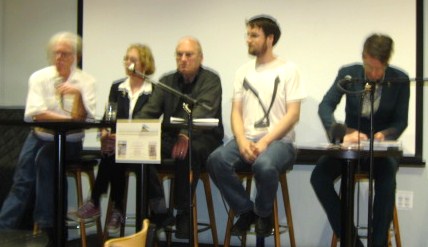
Gregory Feeley, Elizabeth Hand, John Clute, Brendan C. Byrne, Henry Wessells
On a final note, Wessells said that Disch had written a treatment for Disney that generated the original idea for The Lion King. (Well, Hamlet and Kimba the White Lion inspired it too.)
Regrettably, and doubtless embarrassingly, in a bit of strangeness, there were some technical difficulties during the evening, from sudden reverb to lights going on full force.
As traditional, the Jenna Felice Freebie Table offered a slew of books. The audience of perhaps 60 included Melissa C. Beckman (the Readings’ photographer), Moshe Feder, Amy Goldschlager, (House Manager) Barbara Krasnoff, Lissanne Lake and Marco Palmieri. Over the course of the evening, audience members availed themselves of the Café’s food, coffee bar, beer and wine.
That’s about the size of it.
— June 6, 2018

